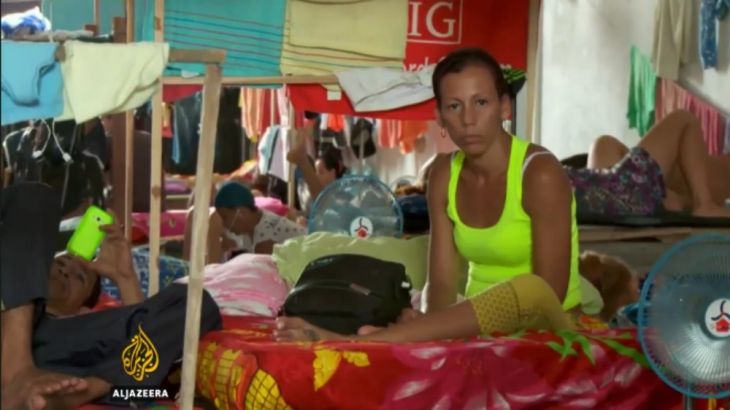Migrants stranded in Colombia as route to US closed
Thousands from Cuba and Haiti, as well as Africa and Asia, seeking to reach US are stranded on Colombia-Panama border.

Turbo, Colombia – Thousands of refugees and migrants from Cuba, Haiti and as far away as Africa and Asia are stranded on the Colombia-Panama border, where they are seeking an overland route to the United States and the possibility of a better life.
“We sold everything we had in Cuba. Our house and everything in it,” Lisbet Franco, one of more than 1,000 Cubans stranded in the small Colombian port town of Turbo, told Al Jazeera on Wednesday.
Keep reading
list of 4 itemsHow can we reduce global food insecurity?
Palestinian Prisoner’s Day: How many are still in Israeli detention?
‘Mama we’re dying’: Only able to hear her kids in Gaza in their final days
“Coyotes [people smugglers] cheated us along the way and now with the border shut off we can’t continue our trip,” said Franco, who, with her family, has spent two months travelling in a bid to reach the US.
Migrants from Latin America have long travelled overland to reach the US border. More recently, they have been joined by a surge in migrants from Cuba, as well as from Africa and Asia.
With the numbers of migrants increasing, Panama’s President Juan Carlos Varela announced in May that key border crossing with Colombia would be sealed.
Thousands of are now stranded in Turbo – their last stop before Panama.
Danger in the Darien Gap
Unable to move forward and with little to return home to, many migrants are attempting to enter Panama though the Darien Gap, one of the most forbidding stretches of mountainous jungle and swamplands in the Americas – as well as an operations base for Colombian FARC rebels and drug traffickers.
Boarding boats in Turbo, the migrants – men, women and children – are dropped off near the border where they continue their journey on foot through the Darien Gap. It is a journey that takes days, and Cuban migrants in Turbo told Al Jazeera that people get lost in the inhospitable jungle and can die there.
Raicel Rosaval was among a group of Cubans who attempted the trek but were intercepted by Panamanian soldiers and sent back to Turbo.
“We asked for help but the soldiers told us no one could cross into Panama,” Rosaval said.
“They gave us a little water and we started walking back. When we reached a small … village one of our companions fainted and started shaking – we thought he would die.”
Nicaragua was the first country to close its borders in November, following an influx of Cuban migrants attempting to reach the US. Though initially facilitating the transit of several thousand Cubans migrants through its territory, Costa Rica also closed its borders in April as numbers grew.
Unlike migrants from other countries, Cubans who make it to US borders have special entry privileges under the Cold War-era Cuban Adjustment Act, which gives them special welfare benefits and allows them to apply for permanent residency after 366 days in the country.
The surge in Cubans taking the land route to the US coincides with the restoration of diplomatic relations between Washington and Havana, and fears among ordinary Cubans that they will lose their more privilieged migrant status.
‘We are just trying to find a place to better our life’
Running short of food and camped in warehouses in Turbo, hundreds of Cubans risked deportation when they took to the streets of the port town this week to protest about their situation. They held banners calling on US President Barack Obama to help and demanding that Colombia airlift them to Mexico.
In May, Panama struck a deal that allowed around 4,000 Cubans inside its borders fly directly to Mexico.
The Colombian government is refusing to help the migrants, saying doing so would encourage more to travel to the area and play into the hands of human traffickers.
“Giving them food would turn into a bigger problem, increasing the number of people coming to Turbo and staying here,” Emelides Munoz, Turbo government secretary, told Al Jazeera.
The migrants say they only want to continue their journey, and with more people arriving in Turbo every day, they believe it will be difficult for Colombia to avoid finding a solution as the situation deteriorates.
“We are just trying to find a place to better our life,” said Chaly Luma, a migrant from Haiti.
“To make a living, you know.”
|
|